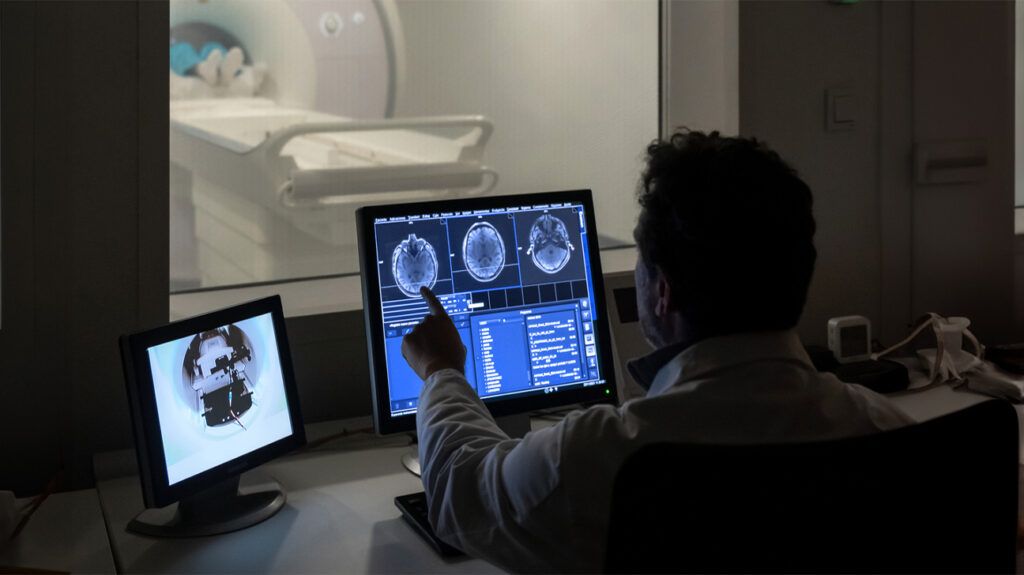Autoimmune neurological diseases are conditions where the immune system attacks nerve cells. Damage to neuronal cells can lead to a variety of neurologic and psychiatric symptoms.
Autoimmune diseases refer to conditions where the immune system mistakes healthy tissues as harmful and attacks them. A neurological condition describes conditions that affect nerve cells, such as those present in the brain and spinal cord.
Therefore, autoimmune neurological diseases are disorders where the immune system mistakenly attacks and damages nerve cells. There are many different types of autoimmune neurological diseases, which can occur due to different causes and triggers. The symptoms of these conditions will vary depending on the nerve cells they affect.

Neurological autoimmune diseases (NADs) describe a group of conditions where the immune system mistakenly attacks the nervous system. Some health experts may also refer to these diseases as autoimmune neurological disorders or autoimmune disorders of the nervous system.
The immune system targets cells in either the central nervous system (CNS) or peripheral nervous system (PNS) and causes damage. The CNS includes the brain and spinal cord, while the PNS consists of nerve cells that lie outside the brain and spinal cord.
The exact cause of NADs will vary. However, they typically occur due to a combination of factors, such as genes, epigenetics, and environmental factors, such as infections, to trigger an autoimmune response. This response results in inflammation and impaired functioning, which can lead to a number of symptoms.
Multiple sclerosis (MS) refers to a condition affecting the CNS. It occurs when the immune system attacks
As well as protecting nerve cells, myelin also allows the nerves to communicate through electrical signals quickly and efficiently. It is also responsible for giving the brain’s white matter its whitish appearance.
The term sclerosis describes the areas of scar-like tissue that result from the damage to myelin from the immune system. The symptoms of MS depend on the severity of the attacks, as well as the location and size of the demyelination. Symptoms may include:
- problems with memory and thinking
- numbness and tingling
- loss of balance and dizziness
- stiffness or spasms
- tremor
- fatigue
- pain
- bladder and bowel problems
- vision problems
Currently, there is no cure for MS. However,
Disease-modifying therapies (DMTs) describe medications that change how the immune system functions. This can help slow MS progression. A doctor may give some of these by mouth, by injection, or as an infusion.
Other drugs, such as corticosteroids, can help when a person experiences a worsening of symptoms during a flare. These medications reduce inflammation and suppress the immune system.
Guillain-Barré syndrome (GBS) is a condition that affects the PNS. It is similar to MS in that it occurs when the immune system attacks myelin. However, it differs in that it occurs when the immune system mistakenly attacks the network of nerves that carries signals from the brain and spinal cord to the rest of the body.
Read on to learn more about MS versus GBS.
GBS occurs due to the demyelination of nerves. Most cases occur following a viral or bacterial infection. However, researchers are still unsure why these triggers cause some people to develop GBS. Some of the most common risk factors for GBS
- Campylobacter jejuni, which causes gastroenteritis
- flu
- cytomegalovirus
- Epstein-Barr virus
- Zika virus
Symptoms of GBS may include:
- weakness or tingling sensations, often starting in the legs
- paralysis
- difficulty speaking or swallowing
At present, there is no cure for GBS. However, some therapies can help reduce its severity, and treatments are available for possible complications.
Healthcare professionals may use either
When GBS symptoms are severe, a person may require help with breathing, a heart monitor, and help preventing food or saliva from entering their airways.
Neuromyelitis optica (NMO) refers to a condition where the immune system attacks myelin in the CNS, mainly affecting nerves in the eyes and the spinal cord. Health experts may also refer to NMO as Devic’s disease or NMO spectrum disorder.
NMO occurs when the immune system binds to a protein known as aquaporin-4. In some cases, the body also attacks another protein known as myelin oligodendrocyte glycoprotein. This activates other parts of the immune system and causes inflammation and damage to myelin.
Symptoms of NMO may include:
- eye pain and vision loss
- weakness or paralysis of limbs
- numbness
- loss of bladder and bowel control
- severe nausea and vomiting
Currently, there is no cure for NMO. However, the Food and Drug Administration (FDA) has given approval to three drug treatments to help reduce the risk of relapse in adults. These include:
- eculizumab
- inebilizumab-cdon
- satralizumab-mwge
Other treatments may include corticosteroids, other immunosuppressive drugs, and plasma exchange.
Autoimmune encephalitis describes when the immune system mistakenly attacks healthy brain cells, resulting in inflammation that leads to neurologic and psychiatric symptoms.
At present, researchers are unsure of the exact cause of autoimmune encephalitis. However, research notes that
There are many possible symptoms of autoimmune encephalitis. Some may include:
- problems with memory and thinking
- problems with balance
- seizures
- hallucinations
- aggressive behavior
- difficulty sleeping
Most forms of autoimmune encephalitis respond well to immune therapies. This can include treatments such as steroids, immunoglobulin therapy, or plasma exchange. Some people may also require supportive medications to help reduce seizures, prevent hallucinations, and help with sleep.
Neurological autoimmune diseases (NADs) describe conditions where the immune system mistakenly targets and damages nerve cells. This can affect the CNS, which includes the brain and spinal cord, or the PNS, which consists of nerve cells outside the brain and spinal cord.
Symptoms of NADs can vary and will depend on which nerve cells the immune system damages. Treatments for NADs typically involve immunosuppressive therapies to help delay the progression of the disease and reduce the severity of symptoms.
